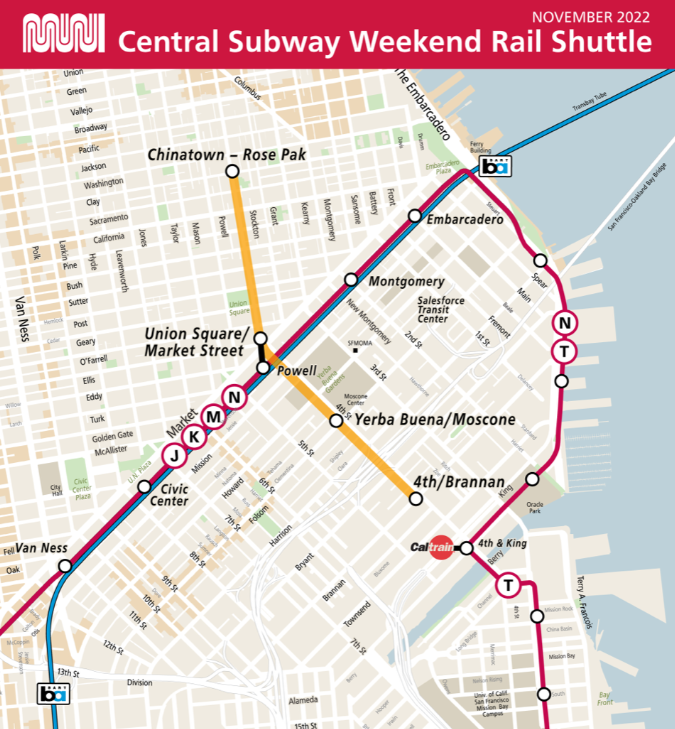The following items are excerpted or summarized from news releases issued by the California Transit Association members. If you are a member of the Association and would like to submit an item to be considered for inclusion in the Member News Library, please email your press releases to Managing Editor Jacob Herson (jake@caltransit.org). Photos and cutline information with your news release submissions, when possible, are encouraged.
Michelle Bouchard Named Caltrain’s New Executive Director
The Caltrain Board of Directors has unanimously appointed Michelle Bouchard to serve as the first permanent Executive Director of the railroad. Bouchard has worked for Caltrain for more than 20 years and has been the Acting Executive Director since April 2021.
Bouchard has spent over 25 years in the transit industry, rising through the Caltrain ranks during the 2000s to eventually become Director of Rail Transportation, where she successfully managed all aspects of the procurement and transition of operations, maintenance and management services. During her tenure, the agency implemented key railroad systems, including the procurement, design, and installation of a new rail operations control system. Her leadership was instrumental in completing operations and capital program planning in support of future blended High Speed Rail service on the Caltrain corridor that provided for the needed funding for electrification and the procurement of an electric train fleet. She also played a vital role in conceptualizing and implementing Caltrain’s Baby Bullet service in the early 2000s, helping to lay the groundwork for the overwhelming ridership demand Caltrain experienced pre-pandemic.
In 2015, after a brief time at the Bay Area Rapid Transit District, Bouchard returned to Caltrain as Chief Operating Officer. In her second stint at the agency, she has overseen the implementation of Positive Train Control and the completion of the Caltrain Business Plan, and associated 2040 Service Vision Plan. Upon taking on the Acting Executive Director role, she has been overseeing the Electrification project, which will modernize Caltrain service starting in 2024. In 2018, she was recognized as one of Railway Journal’s Women in Rail, in recognition of her transportation experience, leadership skills, industry contributions, and involvement in community service.
“Michelle has been a dynamic and engaged leader for Caltrain,” said Caltrain Board Chair Steve Heminger. “She was the clear choice to lead the agency, and we have the utmost confidence that she will continue to improve the service and bring more people back to transit.”
“I want to thank the Board for their confidence in naming me Caltrain’s Executive Director to continue leading the agency where my public transportation career started,” said Bouchard. “We have many challenges before us; we need to continue to increase our ridership, finish the electrification of the system and work with our partner agencies and the communities we serve to continue to grow our service. I can’t wait to get to work.”
Christy Wegener Appointed Executive Director of LAVTA
The Livermore Amador Valley Transit Authority (LAVTA) Board of Directors has announced the selection of Christy Wegener to serve as the agency’s new Executive Director. Wegener previously worked at LAVTA from 2014 through 2018 as the Director of Planning and Operations. For the last four years, she has been the Director of Planning for the San Mateo County Transit District (SamTrans), responsible for strategic and operations planning for the district.
In response to the Board’s selection, Wegener said, “The Wheels bus system is near and dear to my heart and I am thrilled for the opportunity to return. I am excited to work with my former LAVTA colleagues and to improve mobility options throughout the Tri-Valley.”
Alameda County Supervisor David Haubert, who serves as Chair of the LAVTA Board, said “We are very pleased that Christy was interested in returning to LAVTA. During her previous tenure here, she helped lay the groundwork for many of the innovative projects that have been implemented over the past few years, including the introduction of Shared Autonomous Vehicle technology, the Go Tri-Valley partnership with Uber and Lyft, and a fixed route system redesign that led to increased ridership. These efforts played a large role in LAVTA being named the top transit agency in North America in 2020.”
Wegener has spent nearly 20 years in the transit industry, having previously worked for the Sacramento Regional Transit District and the Fairfax County (VA) Department of Transportation. During her career, she has been recognized as one of Mass Transit Magazine’s Top 40 under 40 and is a graduate of the American Public Transportation Association’s Leadership APTA program.
SFMTA Opens Central Subway with Special Weekend Service
San Francisco Municipal Transportation Agency (SFMTA) opened its Central Subway project with special weekend service on November 19. The Central Subway Project will improve public transportation in San Francisco by extending the Muni Metro T Third Line through SoMa, Union Square, and Chinatown. By providing a direct, rapid transit link between downtown and the existing T Third Line route on 3rd Street, the Central Subway will vastly improve transportation to and from some of the city's busiest, most densely populated areas. Four new stations were built along the 1.7-mile alignment.
The special weekend service is offered Saturdays and Sundays, from 8 am to 12 am with trains every 12 minutes. During this special weekend service, customers will have a chance to ride through the new Central Subway for free and get to know the four new stations: Chinatown-Rose Pak at Stockton and Clay streets, Union Square/Market Street Station at Geary and Stockton streets, Yerba Buena/Moscone Station at 4th and Folsom and the new 4th & Brannan stop at 4th and Brannan streets.
During the special weekend service, customers can transfer to the new Central Subway service at Powell Station from Muni Metro and BART by walking underground to the new Union Square/Market Street Station. The new Central Subway connects communities to destinations including Chinatown, Union Square, Yerba Buena Gardens, the Moscone Convention Centre, the Metreon and SFMOMA, just in time for the holidays. SFMTA ambassadors will provide wayfinding guidance online and in-person during special weekend service to help customers learn to navigate the new Central Subway stations and Muni Metro connections.
In January 2023, service will increase to seven days a week.
Modified LA Metro Proposal Would Keep Current Fares and Free Transfers
Los Angeles County Metropolitan Transportation Authority (LA Metro) has finalized a proposal to make paying fares easier and ensure that no one overpays for riding Metro buses and trains. Based on customer feedback, the staff recommendation is to keep base fares at their current prices and continue free one-way transfers between Metro buses and trains for two hours, among other changes.
In October, Metro released a fare capping proposal that would change fares to make them more simple and affordable for its most frequent riders. Metro then held a public hearing on Monday, November 14, to gather feedback from its customers. The agency modified its fare restructuring in response to this feedback as part of the formal recommendation. The Metro Board of Directors will consider the staff recommendation at their meeting on Dec. 1 at 10 am The public can listen/watch the meeting online here and comment at the meeting — the instructions are on page 4 of the agenda.
Other key information about the staff recommendation:
- The modified approach still introduces daily and weekly fare capping in which no one will pay more than $5 a day or $18 a week for unlimited rides. That’s lower than the $6 a day and $20 a week in the original proposal.
- With fare capping, riders would no longer have to purchase daily, weekly, or 30-day Metro passes in advance. They pay as they go with Stored Value on TAP cards — and when they reach the fare cap then they pay no more.
- The staff recommendation keeps the base fare the same for senior and disabled riders, and the off-peak fare is being eliminated so customers can ride any time for the same price. Also, the base fare is lower for student and college/vocational riders.
- LIFE riders will receive 20 free rides per month (with free transfers within two hours) under the staff recommendation and then pay per ride until they reach the daily or weekly cap. LIFE riders will only pay for rides they take.
- The staff recommendation is to eliminate charging extra fare for the J (Silver) Line and express buses. Fares for the J Line and express buses would be the same as for all Metro buses and trains.
- The staff recommendation also includes extending the 50 percent discounts to regular daily, 7-day, and 30-day passes until fare capping is implemented — which would happen next summer if the Board approves the proposal.
- To take advantage of fare capping, customers need to pay fares with a TAP card.